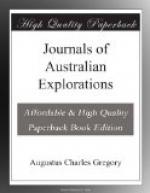several wells were found, some containing rather brackish
water, but one, about eight feet deep, in a hollow
under a steep range of bare volcanic and granite hills,
not more than 200 yards from the beach, was found
to contain an abundant supply of good water; grass
being plentiful and of fine quality in the valleys
under the hills. Our principal requirements being
now satisfied, it only remained to bring the ship
in near enough to land the horses. On our return
to the Dolphin we found that she had been visited by
two natives, who had paddled off on logs of wood,
shaped like canoes, not hollow, but very bouyant,
about seven feet long and one foot thick, which they
propelled with their hands only, their legs resting
on a little rail made of small sticks driven in on
each side. At first they were afraid to come
on board, but on friendly signs being made, they ascended
the ladder that had been put down for them. They
were both fine-looking men, of about forty years of
age, above the middle stature, one measuring six feet
four inches, and the other five feet eight inches;
their hair straight and black, teeth regular, and
general features characteristic of the tribes on the
west coast; their bodies were rather more spare, and
had not on them a vestige of clothing. The Champion
Bay dialect was quite incomprehensible to them; they,
however, knew the use of both biscuit and tobacco,
some of which was given them. After remaining
several hours on board, they took their departure
for the eastern shore of the bay, distant at least
six miles, promising by signs to repeat their visit
the next day. It is worthy of remark that neither
of these natives were circumcised, or had lost the
front teeth, as is common on this coast further to
the eastward. Their fearlessness and confidence
in the good faith of Europeans would lead to the impression
that this was not their first acquaintance with vessels
on the coast. It was not far from this place
that Captain P.P. King had a visit from natives
similarly equipped more than forty years ago.
While on shore to-day several new and very beautiful
plants and flowers were observed, amongst them one
in particular, which, without exception, is the handsomest
shrub I have ever seen in Australia; in form the plant
resembles a large chandelier, with a series of branches
springing from a centre stem in sets of five each;
on these are short erect stems a few inches apart,
carrying five beautiful deep crimson dragon flowers,
nearly three inches in length, grouped like lustres,
producing a very gorgeous effect; the leaves of the
plant are elegantly formed, like those of the mountain
ash, and are of a rich green. A purple flowering
bean, the seeds of which are the size of the English
horse-bean, is here found in abundance, and are eaten
by the natives. Melons similar to those formerly
seen by me on the Gascoyne, several varieties of brachychiton,
a small variety of the adansonia, three or four different
kinds of convolvulus (one of which runs along the
sands near the beach with arms sometimes as much as
forty yards in length), acacias, sterculia, and a
variety of eucalyptus resembling a stunted red-gum,
are also found growing among the hills in small quantities.




